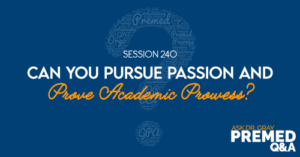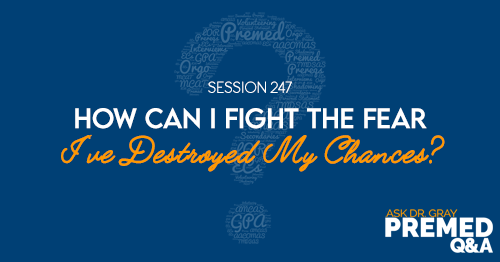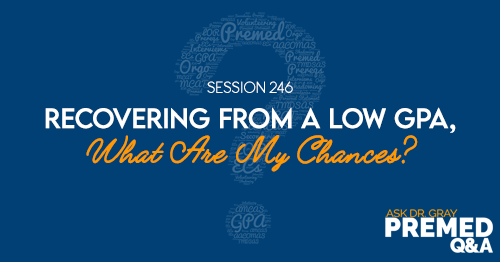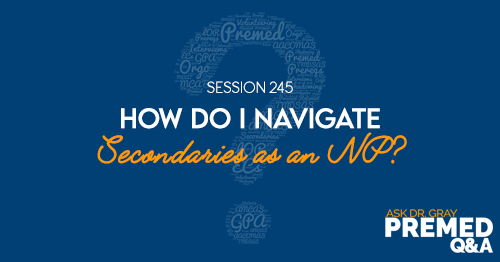Apple Podcasts | Google Podcasts
Session 240
This student is struggling with their premed courses and is unsure whether pursuing a Master’s in Public Health would be beneficial for medical school admissions or if they should focus on retaking undergraduate courses.
Ask Dr. Gray: Premed Q&A is brought to you by Blueprint MCAT. Listen to this podcast episode with the player above, or keep reading for the highlights and takeaway points.
The episodes in this podcast are recordings of our Facebook Live that we do at 3 pm Eastern on most weekdays. Check out our Facebook page and like the page to be notified. Also, listen to our other podcasts on MedEd Media. If you have any questions, call me at 617-410-6747.
Question of the Day:
“As a student who just graduated with a Bachelor’s of Science in Public Health and is currently taking premed classes, I’m at a crossroads. My academic performance isn’t as strong as I’d like it to be, and I’m considering pursuing a Master’s degree.
I’m particularly interested in a Master’s in Public Health, as my passion lies in community service and initiating public health programs. However, I’m unsure if this will be beneficial for my future. Could you provide some guidance on whether this would be a good step for me?”
Balancing Passion and Academic Ability
It’s common for students to juggle two aspects – their passion and the need to demonstrate academic prowess. In your case, you have a keen interest in public health and addressing healthcare disparities. However, a Master’s in Public Health (MPH) may not necessarily showcase your academic ability, particularly in hard sciences, which is often what medical schools look for.
The Role of an MPH
While an MPH covers important topics like statistics and epidemiology, these do not compare to subjects like biochemistry and physics that are considered hard sciences. You could pursue an MPH if that truly aligns with your interests. Alternatively, you could seek out medical schools that support obtaining an MPH during medical studies and focus on improving your grades for now.
Identifying the Roadblocks
The most critical question you need to ask yourself when you’re struggling academically is – why? What’s preventing you from excelling academically? Many students face various challenges, such as supporting a sick family member or working multiple jobs, that prevent them from dedicating enough time to their studies.
If something in your life is hindering your academic success, it might be wise to take a break from education. This can prevent the continuation of poor grades and allow you to reset. It’s akin to playing jump rope; you need to know when to jump in.
“If you have something in your life that’s distracting you from proving yourself as a student, because you don’t have time to be a student, then you’re not setting yourself up for success.”
Before you impulsively dive into a master’s program, take a moment to reflect on why you’re currently struggling. Ask yourself if anything would change if you were to start a master’s program right now or if you’d likely continue facing the same issues. This introspection is crucial in helping you make an informed decision about your next steps in your academic journey.
Now, this student expresses a limiting belief, stating she’s always been a ‘B’ student. This defeatist mindset caps her potential, suggesting she’s confined herself to always being a ‘B’ student, thereby setting her own limitations.
Course Retakes and the Consideration of Community College over University
Q: “Should I consider retaking any courses? Also, I’ve been contemplating attending community college due to the rising costs of university. What do you think?”
A:
Retaking Classes
When it comes to retaking classes, several factors come into play: the courses you’ve already taken and your grades in those courses. Then you have to compare between retaking classes and taking upper-level courses. You also have to look into whether you’re prepared for advanced classes if you haven’t fully grasped the foundational material. There are many variables to consider.
I recommend creating a Mappd account if you don’t have one already. Enter all your grades, and with the free trial of Mappd Pro, you can chat directly with our advisors on the platform. They will have access to your grade trends and can provide more detailed advice.
Regarding the issue of retaking classes, the GPA calculation remains the same regardless, so there’s no distinct advantage or disadvantage in that respect.
The Potential Upside of Community College
The choice between community college and a four-year university is indeed a significant decision. Many people find the cost per credit significantly cheaper at a community college, although some medical schools may not view it as favorably. It’s unfortunate that some institutions disregard the value of community college education.
There are numerous medical students I’ve assisted who completed their prerequisites exclusively at community colleges. When questioned about their decision, they had sound reasons, which were accepted by the schools they applied to.
Choosing What Works Best for You
The issue often arises when a student struggles at a four-year university, shifts to a community college, and suddenly starts achieving high grades. It raises questions, but it could be due to improved study habits or less financial stress, allowing you to focus more on your studies. These variables aren’t always considered in the community college versus university debate.
If enrolling in a community college better suits your schedule and financial situation, go for it. Just be prepared to articulate your reasons when asked.
Q: “So, is your primary advice for me to concentrate on my undergraduate pre-med courses right now instead of pursuing a master’s degree?”
A: Do not to rush into a Master’s, especially an MPH, at this point. If you do decide to go for a master’s, consider a Special Master’s Program (SMP) or a program specifically designed for pre-health students that includes hard sciences.
Balancing Activities in a Competitive Premed Landscape
Q: “As a medical assistant, I’m likely to accumulate more than 1,000 hours of experience. Is that sufficient given how competitive the field is becoming? Additionally, I’ve done some volunteering and have held leadership positions in undergraduate organizations and research. Do you think all these experiences combined are enough?”
A: I’m hearing more and more from deans and directors of admissions, that community service is something that is becoming more and more important to admissions committees.
It doesn’t mean you need a thousand hours for clinical experience, but it means once every couple of months. Whether that’s being at the soup kitchen, a homeless shelter, Habitat for Humanity, or at the senior center doing stuff.
Unraveling the Mystery of Underperformance
It’s important to critically evaluate why you’re not achieving the grades you aspire to, without succumbing to a defeatist mindset that confines you to being a ‘B’ student. The answer lies not in self-deprecation, but in exploring all available resources like office hours and tutoring.
Recognizing Hidden Learning Disabilities
In fact, this could go as far as even assessing whether learning disabilities such as ADHD or dyslexia might be impacting your academic performance.
In my experience, I’ve often found students unaware of their learning disorders until they undergo testing. A common narrative is a student who understands the course material perfectly during a verbal quiz but fails to reproduce the same results in a written test.
Upon evaluation for dyslexia, it turns out that this was the hidden obstacle impeding their success.
Leveraging Resources and Lifestyle Changes for Academic Success
Therefore, instead of accepting the label of a ‘B’ student, it’s crucial to investigate what’s not working. Perhaps there’s a disconnect somewhere – in absorbing the information, or in expressing it. Using resources like teachers, TAs, and campus tutors can help pinpoint where this disconnect lies.
Moreover, don’t overlook the role of lifestyle factors in academic achievement. Regular exercise, adequate sleep, and other health habits significantly contribute to your cognitive abilities. So, it’s not about resigning to being a ‘B’ student, it’s about finding out why things aren’t clicking and addressing those issues.
Links:
Medical School HQ Facebook page
Medical School HQ YouTube channel
Instagram @MedicalSchoolHQ
Join the Application Academy!
The Premed Playbook: Guide to the Medical School Personal Statement
The Premed Playbook: Guide to the Medical School Application Process
SEARCH SITE
LISTEN FOR FREE












